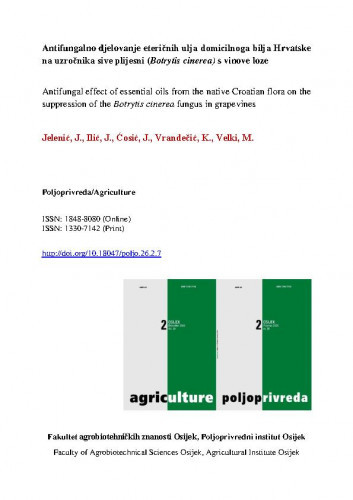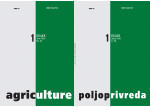U istraživanju je ispitivano djelovanje eteričnih ulja domicilnoga bilja Hrvatske na supresiju rasta micelija Botrytis cinerea izoliranoga s vinove loze. U pokusu su korištena ulja sljedećih biljaka: metvice paprene (Mentha x piperita), kadulje (Salvia officinalis), ružmarina (Rosmarinus officinalis), lavandina (Lavandula hybrida), mravinaca (Origanum compactum), timijana (Thymus vulgaris), gospine trave (Hiperici oleum), stolisnika (Achillea millefolium) i smilja (Helichrysum italicum). Rezultati in vitro volatilnogq testa i makrodilucijskoga testa pokazali su da ulja timijana i paprene metvice mogu imati pozitivan utjecaj na inhibiciju rasta gljive Botrytis cinerea pri svim ispitivanim koncentracijama te da fungistatski učinak traje i preko 96 h. Primjena ulja stolisnika i gospine trave u makrodilucijskoj metodi dala je bolje rezultate u odnosu na volatilnu metodu. Eterično ulje smilja stimuliralo je porast micelija B. cinerea u obje metode. S obzirom na smanjenje porasta micelija B. cinerea u uvjetima in vitro, eterična ulja, kao biofungicidi, predstavljaju moguću zamjenu za sintetske pripravke u suzbijanju razvoja sive plijesni na vinovoj lozi, no potrebna su dodatna istraživanja kako u uvjetima in vitro, tako i u uvjetima in vivo.; The aim of this research was to determine the effect of nine essential oils from the Croatian native flora (Mentha x piperita, Salvia officinalis, Rosmarinus officinalis, Lavandula hybrida, Origanum compactum, Thymus vulgaris, Hiperici oleum, Achillea millefolium and Helichrysum italicum) on the Botrytis cinerea mycelial growth suppression. The research results demonstrated that the oils of Thymus vulgaris and Mentha x pipereta in both investigated methods (the volatile and the macrodillution one) have exerted a positive influence on the suppression of mycelial growth. Also, the aforementioned oils had a fungistatic effect in all investigated concentrations long after 96 hours. The essential oils of Achillea millefolium and Hiperici oleum in the volatile method have not manifested a suppression effect, while the effect of suppression of a mycelial growth was recorded in the macrodillution method. The essential oil of Helichrysum italicum stimulated the growth of B. cinerea mycelium in both investigated methods. Considering a reduction of the mycelium growth, the essential oils, as a biocontrol agent, could be a positive substitution for the traditional pesticides in grapevine gray mold control. Additional investigation with regard to the essential oils in the Botrytis control are needed both the in vitro and the in vivo conditions.
Sažetak

 Poljoprivreda : 26,2(2020) / glavni i odgovorni urednik, editor-in-chief Manda Antunović.
Poljoprivreda : 26,2(2020) / glavni i odgovorni urednik, editor-in-chief Manda Antunović.